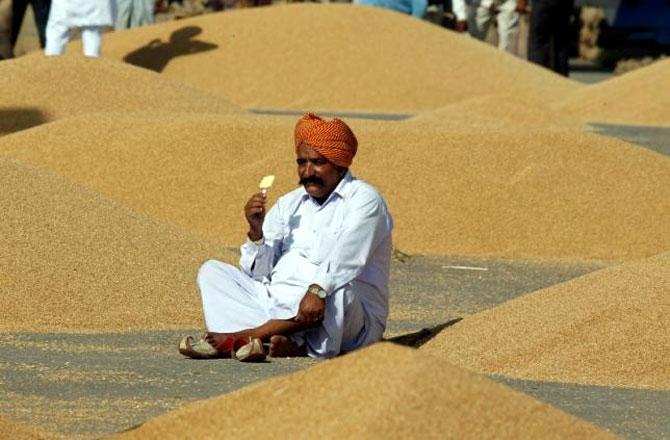In total, the Centre plans to purchase around 40.7 million tonnes of wheat from farmers this year, which is almost 19 per cent more than last year.

After initial hiccups, procurement of wheat, the biggest rabi crop, has picked up in major growing states.
This comes amid complaints of mismanagement while implementing the COVID-19 guidelines in some mandis.
It is forcing farmers to stand in long queues, awaiting their turn to sell.
The sudden unseasonal rains in North India since the last few days have added to their worries.
Wheat is largely procured from Punjab, Haryana, Madhya Pradesh, Uttar Pradesh and Rajasthan in the rabi season by the Food Corporation of India (FCI) and state agencies on behalf of the FCI.
In total, the Centre plans to purchase around 40.7 million tonnes of wheat from farmers this year, which is almost 19 per cent more than the wheat procured last year.
More than 80 per cent of the rabi cereal crops, of which wheat is one of the largest, have already been harvested, according to the government.
Punjab
Wheat procurement started in Punjab, the biggest contributor to the central pool.
From April 15 till April 27 (Monday), around 4.82 million tonnes of wheat has been procured by state and central agencies.
This is almost 15 per cent more than the same period last year.
The state has so far issued 0.71 million passes to farmers to sell in the designated (almost) 4,000 purchase centres.
“Though the state government claims procurement is happening smoothly, in several places farmers are facing an acute shortage of jute bags to pack wheat and transport them,” said Balbir Singh Rajewal, head of Bhartiya Kisan Union (Rajewal faction).
He said payments due to several farmers have still not reached them.
The state government had promised that MSP will be credited into their bank accounts.
Haryana
Haryana has so far procured around 1.90 million tonnes of wheat till Monday.
Procurement started from April 20 in the state, a delay of almost 10 days as most mandis were closed due to the lockdown.
Apart from wheat, the state government also procured over 0.24 million tonnes of mustard from farmers in the last few days.
However, farmers claimed the state government’s order to allow entry of only 100 tractor trolleys per day in each mandi is slowing procurement and leading to commotion.
“In bigger mandis, which has more than 400 commission agents, the 100-trolley rule is making them sit idle as one agent has to sell one trolley in four days.
"In smaller mandis, this is leading to commotion and there isn’t enough space to bring the tractors,” said Gurnam Singh Chaduni, a farmer leader from the state.
Madhya Pradesh
In Madhya Pradesh, the state government claims that it has managed to purchase more wheat in the first 11 days of procurement this year than it did in the first 21 days of last year.
However, farmers complained that in several mandis the mobile SMS wasn’t working, compelling them to stand in queues for hours to sell their wheat.
So far, in MP, the government has purchased over 1.68 million tonnes of wheat in the first 11 days.
The state has a unique SMS system, wherein only those farmers who get SMSes will have to come with their wheat to sell at the designated mandi at the fixed date and time.
State officials claimed that in the first two days, just six SMSes were sent out for each of the over 4,300 purchase centres.
This was gradually scaled up so that social distancing norms are followed while farmers do not hold on to their produce for long.
“In some mandis, procurement is going on smoothly, while in others there have been complaints of farmers getting multiple SMSes.
"This led to some of them being sent back by mandi officials. Others were asked to wait in long queues,” said Bhagwan Meena, general secretary of Kisan Swaraj Sangathan, a farmers’ organisation.
Uttar Pradesh
The UP the state government has just started procurement.
So far, it has purchased 0.36 million tonnes of wheat from farmers, according to the FCI.
“More than procurement, we are worried about the weather, which has suddenly become unfavourable in North India.
"If it rains heavily in the coming days, we will suffer huge loss,” said Dharmendra, another leader of the Bhartiya Kisan Union.
Photograph: Ajay Verma/Reuters












 © 2025
© 2025